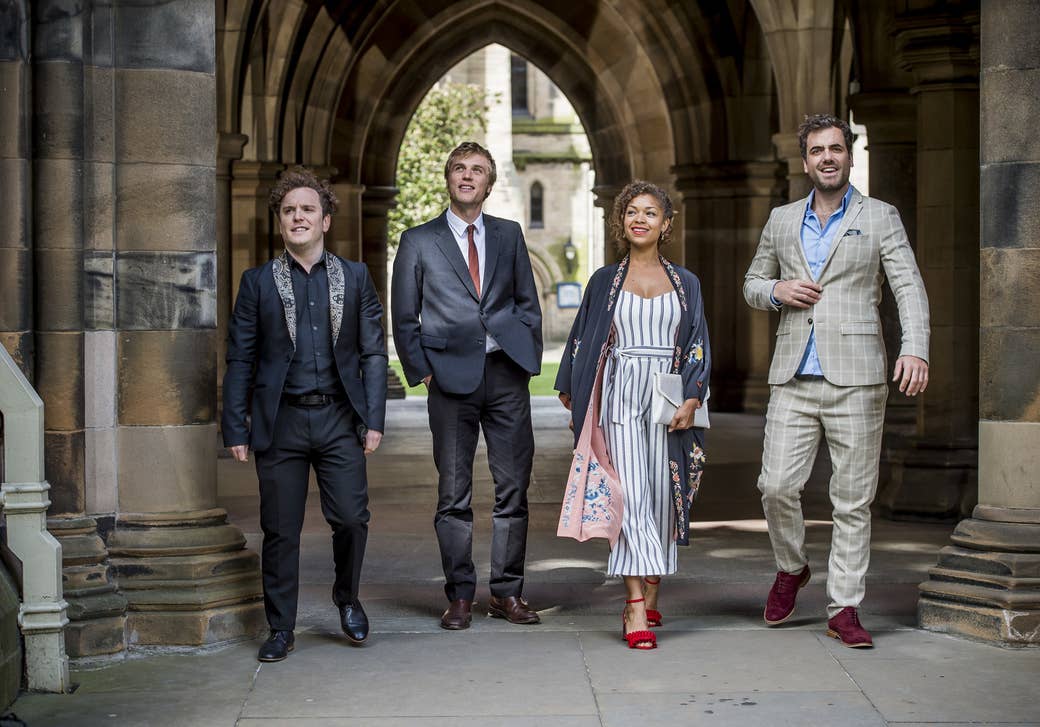
The best romantic comedy of the last decade or so is around nine hours long, and has been hiding in plain sight behind a thin veneer of chlamydia, Point Break reenactments, and surprisingly poignant musical choices.
Netflix’s Lovesick (née Scrotal Recall), which is now in its third season, has quietly delivered a rich tapestry of the emotion we humans call love, without being cloying, needlessly dramatic, or entirely implausible. That’s because the villain of the piece is not the buxom redhead next door or some muscle-bound Tom-of-Finland type, nor is it basic misunderstandings that could be cleared up in a simple, single conversation. Instead, Lovesick’s main villain is something a little more quotidian: bad timing, and that most politely British of things, good manners.
The premise must have appeared shaky as romantic fodder: Glasgow-dwelling Dylan (Johnny Flynn), a young man with bad hair who discovers he has a sexually transmitted disease, is required to call upon his past lovers in an act of good sexual etiquette. (“Do I have to call everyone?” Dylan asks, only for the doctor to retort, “Only the ones you like!”) As he works down the list, he’s ably assisted on his quest by his two best friends: Luke (Daniel Ings), sexual napalm tearing through the local female population, and Evie (Antonia Thomas), their sharp and arty housemate who has a complicated romantic history with Dylan. But what has emerged since that first episode has proved stronger than a strain of Dylan’s chlamydia.
Instead of the expected puerile comedy, Lovesick tells a far sweeter and more generous story about friendships, love, and loss. The lives of the trio (now expanded to include their friend Angus, the anxious people-pleaser, among others), have become a sort of quasi-manual for people navigating that post-university, pre-real-adulthood life. Dylan’s journey into his past widens into so much more than a history of sexual partners: It’s a road map of all sorts of relationships, and how everything in the present gets to be the way it is.
Back in 2011, Mindy Kaling wrote that the degradation of romantic comedies meant that declaring oneself a fan of the genre was “essentially an admission of mild stupidity.” But Lovesick makes us care. What Lovesick does is rooted in the stuff of classics: The romance is romantic; the comedy is funny. Beleaguered best-friends-in-love Evie and Dylan; Luke, whose sexual voracity is borne of loss; and Angus, with his inability to read the temperature of a romantic encounter, all feel like they could be our friends, or, indeed, ourselves. The genius of the show is its sincerity and its true delight in untangling human nature itself. Above all, this is a show that doesn’t sneer at love in all its permutations. So how do the show and its creator do it?
The idea for Lovesick coalesced over the course of two years, starting with a conversation the show’s creator and writer, Tom Edge, had with a researcher tracking human history at the Wellcome Trust Centre for Human Genetics.
In a phone interview in December, Edge, 40, whose writing credits include The Crown and an upcoming biopic of Judy Garland, recalled talking with the researcher about “tiny little disease-causing mutations, and I thought for a while, ‘What might be the smaller version of that?’ And the passage of an STI between people occurred as a way to sort of track interlocking relationships.”
Edge was interested in investigating our preoccupation with how we remember our past versus the truth of it.
In developing the show, Edge found himself thinking of the common thread in all his favorite romantic comedies. “[They all] had this kind of melancholic structure where the protagonist is looking to find answers. We talked a lot about Annie Hall, beginning with ‘Annie and I broke up.’ We touched on High Fidelity, and that similar kind of looking through the carnage for answers. And one of my favorite films is Groundhog Day, and again, it’s the concept of being forced to go over and over old ground that eventually leads to those epiphanies. So many of the ones that feel detailed and textured involve that kind of relationship between past and present.”
The final piece of the show’s DNA came after Edge read Memory, an anthology coedited by A.S. Byatt and Harriet Harvey Wood that he describes as “a rattlebag compilation of scientific papers and 18th-century poetry about memory. One of the pieces in that was about this guy who tried to create an equation for human forgetting in that amazing 19th-century way of ‘let’s codify everything!’ Those breakups that have left us paralyzed, those snot-dripping, ‘life can never be the same’ kind of days — I find 10 years later we probably feel indifferent about that person. I’ve always thought that was an interesting human thing. A very gentle and kind thing about memory is its capacity to blunt pain to manageable levels.”
Edge was interested in investigating our preoccupation with how we remember our past versus the truth of it. And of course, how romantic comedies can help their characters seek answers not just through relationships with people, but through their own relationship with time. As for the name Scrotal Recall, it was just a working title that stuck around a little too long. “I can’t tell you the embarrassment of having to say the name,” said Antonia Thomas. “I was in Los Angeles taking meetings and having to find creative ways of talking about the show without mentioning the name. It is very British.”
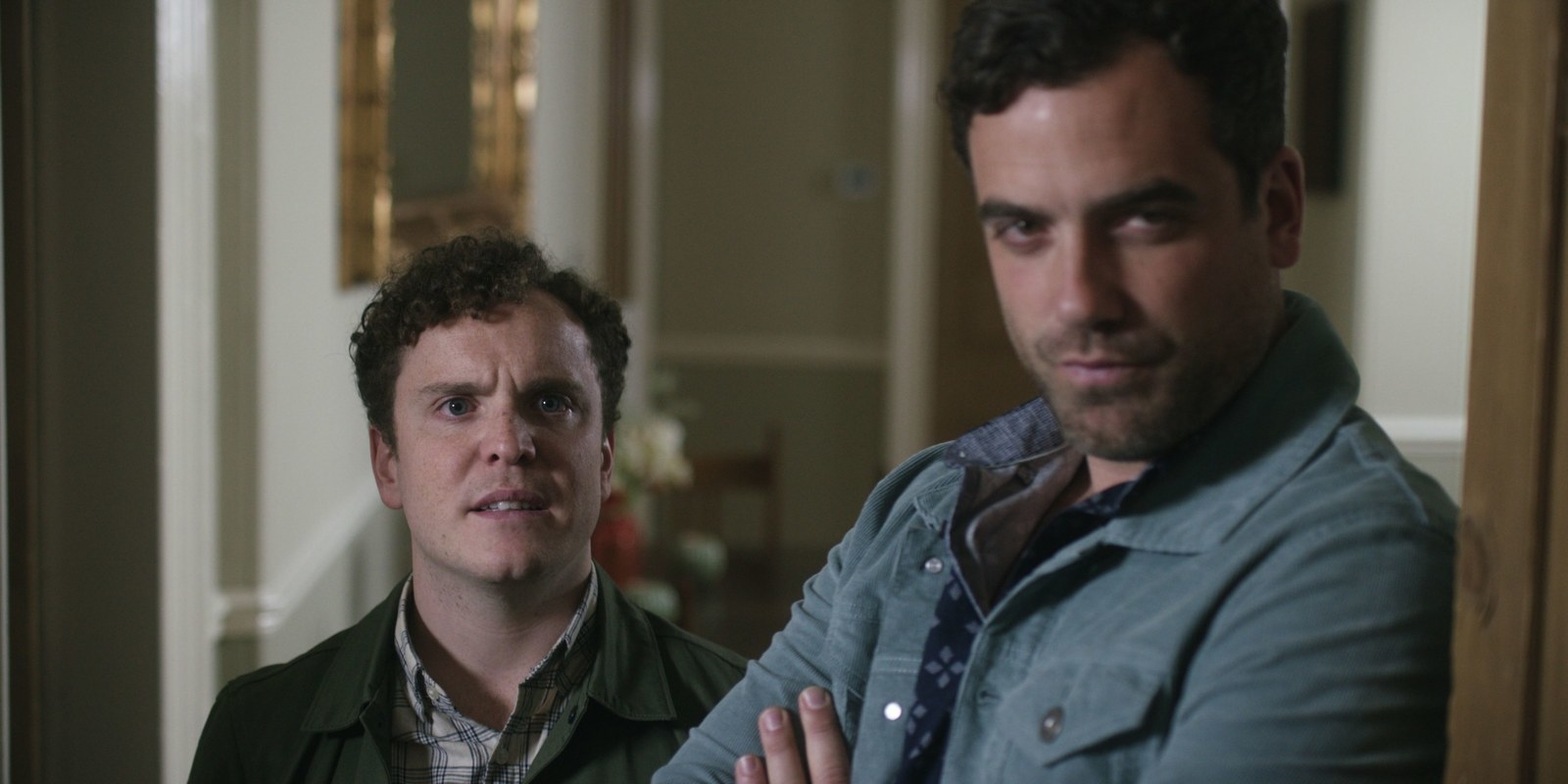
For Edge, it was also important that the premise of bad timing not wear too thin — viewers can put off gratification but need to know the story is progressing. Anything less would be a disservice to the characters, he said. And the characters’ likeability — especially in the case of Dylan and Evie — is what makes writing their conflicts “a good challenge.” It could, however, have sent the show into a sort of elongated, full-blown simper. “[Lovesick is] not a show about terrible people in awful situations,” said Edge. “I enjoy a lot of those shows, but this isn’t one of them. One of the things that has kept them apart, apart from their sucky timing, is that they genuinely like each other and they want each other to be happy. I’ll always be interested in that.”
“I mean, Evie spent almost six years kindly being Dylan’s wingman,” said Thomas. “Listening to him and watching him make terrible mistakes, all the while desperately in love with him. I think in real life, people actually go along with their situations and often do suffer in silence. [The show] feels like a true reflection of how people deal, and slowly maneuver, taking baby steps towards something when really they should just say it. It resonates hugely.”
Television often explores the various ways being bad complicates narratives, but Edge was also interested in how being (at least regarded as) “good” can throw just as many wrenches into the works. “I thought, actually, there are problems of being a good person as well and sometimes those are real problems.”
If a person spins out a relationship, for example, instead of breaking up, do they still get to keep calling themselves a good person? “I was interested in exploring some of that terrain alongside some of the more queasy and more direct stuff,” said Edge.
How do you make someone whose romantic idealism appears almost crippling also a character you want to root for?
Dylan, a dyed-in-the-wool romantic, has almost no hard edges — how do you make someone whose romantic idealism appears almost crippling also a character people want to root for? “I think there’s a sincerity to what Dylan does. We never feel like he’s a bad person that’s just sort of blazing through every woman he knows in pursuit of something unattainable. He’s just kind of cack-handed about how he understands himself,” said Edge, through a laugh.
The key to ensuring Dylan is not entirely wet is that dysfunction, which adds some necessary roughness to his personality. “I don’t know what it’s like with some of your friends,” Edge continued, “but some of mine who are the most giddily romantic, there’s a dysfunction to it on some level. They’re the people who find it hard to sustain relationships sometimes, and I think that’s because they hope for so much and the bar is set so high in terms of the Platonic ideal of romance that they’ve kept in their heads.” The question Dylan has to ask himself is whether his behavior is pathological — and is it actively hurting him?
In the third season, Evie and Dylan finally admit their feelings to one another, leaving Dylan’s girlfriend Abigail on the outs. The fourth episode swings from the lovers, cocooned in their newly formed bubble, to the task of post-breakup asset redistribution between Dylan and Abigail. The focus on Abigail (Hannah Britland), in a moment of what would be unqualified joy in another show feels heartbreakingly real, and is a fine showcase of Lovesick’s mastery — this was no disposable love rival.
“I think [in] the heyday of romantic comedies ... they had people like Ralph Bellamy in His Girl Friday who were positioned on the screen to be the throwaway, slightly dull alternative through which your hero or heroine’s emotional progress is measured,” said Edge. “And they usually found some kind of usher or other minor character to pair them off with to pull the acid from it.” But, Edge felt, Abigail ≠ Bruce Baldwin.
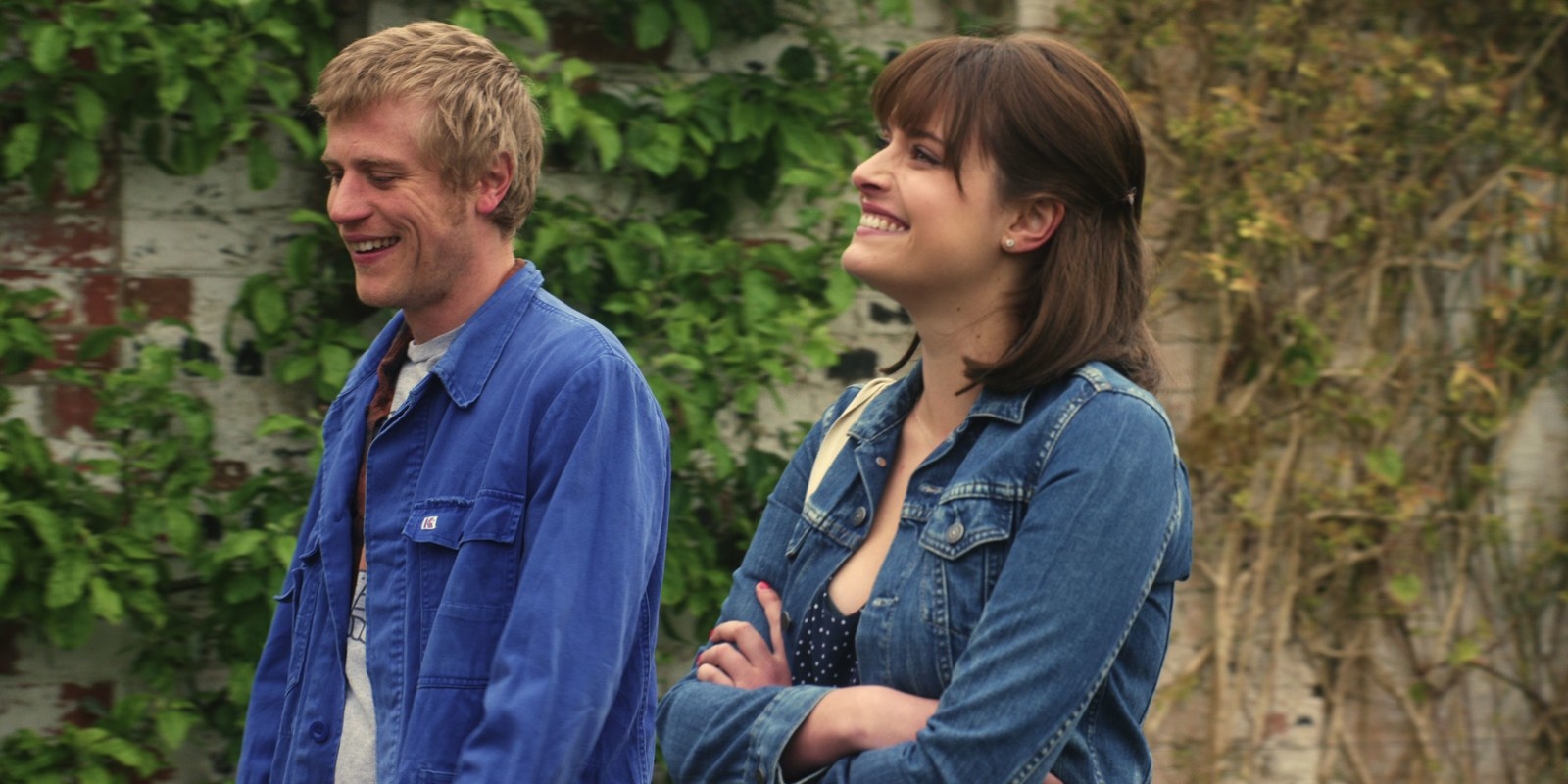
“Hannah had made some choices all the way along that meant that I probably invested more deeply in [Abigail] than I thought I would starting out with the series,” Edge said. “And I felt like, yes, the easy route is to focus on all the long-overdue kissing and the joy of that release of tension. But the situation is nuanced; somebody is waking up across town and feeling terrible.” In giving Abigail the dignity of being more than an inconvenient chess piece in someone else’s game, the story becomes infinitely richer. The people involved aren’t heedlessly throwing away the rest of the universe. "I was really glad that [Abigail] had those episodes where she’s front and center.”
When Dylan returns to his flat after collecting his things from Abigail’s place, he and Evie turn sharp toward one another, a careful scene that highlights the ways in which love does not come with instant, all-consuming reassurance. Alongside the other housemates’ own dramas, the day ends with them all on the stoop, assessing their new realities. “It was an episode I knew I wanted to write, right from the off,” said Edge, “where none of the characters leave their bedrooms until the end. I knew it would be the morning after seismic shifts, so that you are always moving between the intimacy and closed-world feel of the different bedrooms.” It’s not until the final scene that all the characters convene and reunite on the steps. Edge said, “If there’s a thesis behind it, it’s that those cloudless days are rare, but it doesn’t mean a cloudy day is without riches.”
The answers the show seeks extend beyond the messiness of romantic love, too. “It broadened out into thinking, well this is actually going to be how we understand friendship as well,” Edge said. “It’s about understanding the depth of love that exists between friends, male friendships, and platonic friendships between Evie and Luke, for example.” That post-university phase where, as Thomas puts it, “people flounder for a lot longer,” is full of these intense relationships that mean very much. On Lovesick, these connections are given the same weight as the central romantic one, the result of a perfect marriage between Edge’s writing and the cast bringing it life.
According to Thomas, Evie’s relationship with Luke is similarly important as the one with Dylan. “Evie and Luke’s friendship is my favorite, actually. They have this way of being with one another, and when it comes to it, they are 100% there for each other and it’s so sweet and heartwarming. Luke has been there watching these two. He’s the third man. He’s an integral part of the fabric of [Evie and Dylan’s] relationship.”
The relationship between Luke and his “Dyl-pickle” in particular is stirringly affectionate: They are notably tactile and gentle with one another, in an authentic way not often seen on television. “I definitely wanted to write that friendship with the detail of two guys who love each other sincerely, and don’t always understand each other but have the will to cross that divide,” said Edge. “I wanted that tenderness and closeness there, and to have men who could be more than just the tiresome trading of banter, but who could actually give each other consolation and that sense that they were sharing a journey.”
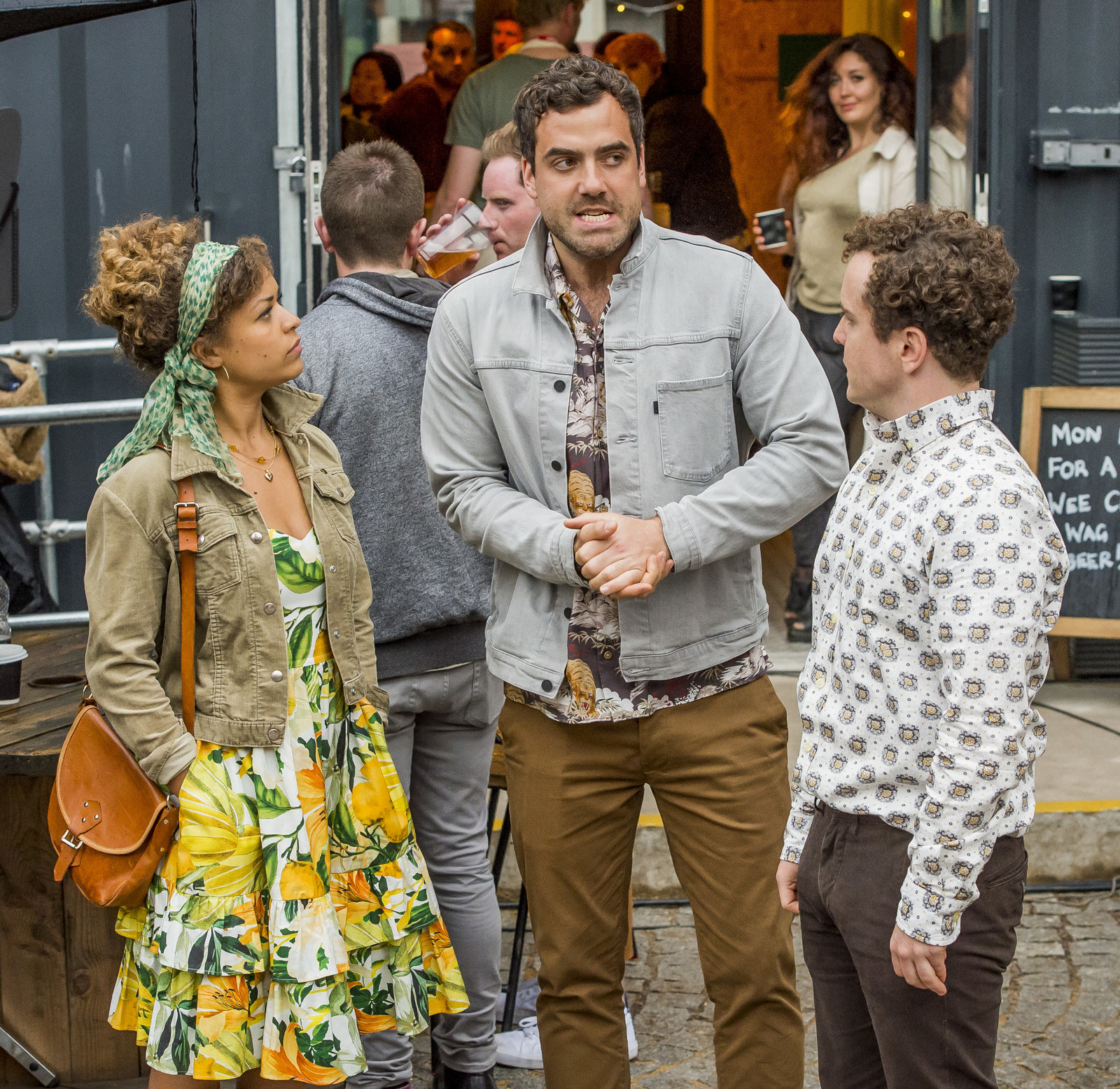
The chemistry between the performers was revealed in the earliest reads between the main cast. “Ultimately, when we got Johnny and Antonia and Dan in the room, we saw a lot of the same kind of affection that viewers have picked up on, so that seemed to be the best fit.” And that chemistry became a big part of the storylines that have emerged over the seasons. “When we got to watch the choices they made as actors in the first season play out, [that] informed the writing of the second season.”
Edge has also broadened roles for actors who were meant to have much shorter arcs. Most pressingly for this season, the return of uni friend Jonesy (Yasmine Akram) brings some complication for Luke. “I definitely knew that by the end of Season 2 I wanted there to have been a kind of a flip of Dylan and Luke’s situation,” said Edge. “I knew that we wanted to take Luke to that point, but it was really seeing Yasmine’s performance in the seventh episode of the second season, where they share some of that gung ho, ‘life of the party’ energy, where we thought this is somebody it would be great to return to.”
This season, Luke’s therapy sessions have also led him to new insights, and he’s set his sights on Jonesy, who is the Happiest Single Girl In The World. “There’s this long history of romantic comedies where the guy turns around and says it’s you and then the woman sort of folds gratefully into his arms, and that always seems both kind of tired and presumptuous,” said Edge on a laugh. “I don’t necessarily think that being Luke’s answer means that Luke is her answer.”
Jonesy’s happy singleness is not dismissed, even if the season does end with her climbing into Luke’s bed with a softly uttered “This is such a mistake.” And her perspective is one Edge wanted to feature. “It’s not often in the culture that women in fiction are able to state, I’m simply not interested in a relationship, without it being hung on something pathological, like there is a deep wound that must be fixed and we just need 14 sessions in therapy and we’ll have you begging for the wedding gown in no time,” said Edge. Luke’s belief that Jonesy will follow in the footsteps of his own path to self-awareness is simplistic and presumptive, and ripe for exploration in the next season.
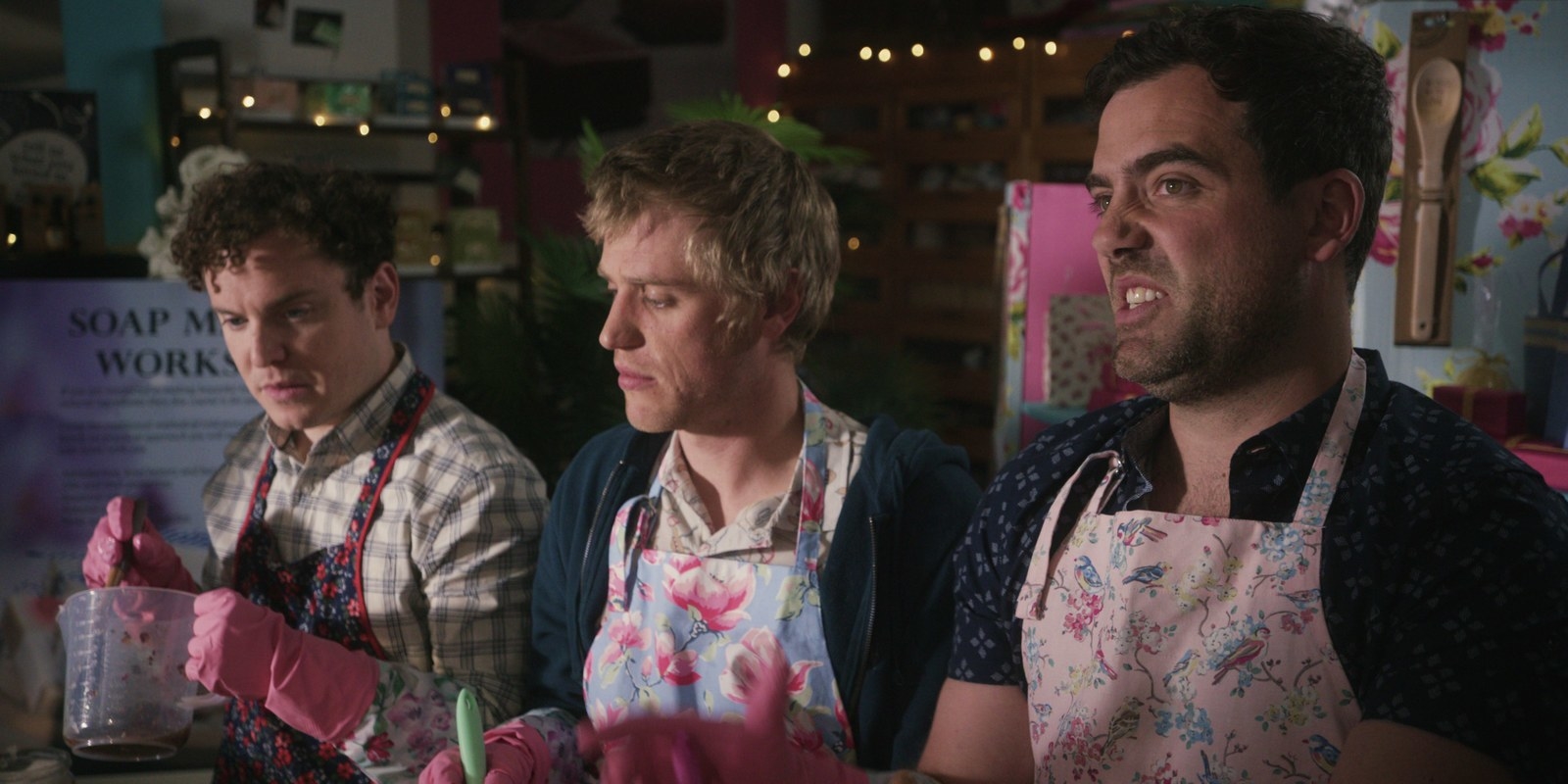
The inverse of Jonesy is the miserably alone Angus (Joshua McGuire, whose role also expanded following the first season). Does Edge take a dim view of singleness, or is that just an inadvertent side effect of writing a rom-com, where “together” is intrinsically seen as better than “alone”? “We did always want to tell stories about love, sex and relationships, and so to have a character who is central and consistent and who was completely disinterested in that... I mean, that’d be quite an interesting provocation,” said Edge. “It does seem to, on some level, offer the idea that truest happiness lies in this direction, by finding the one person to couple up with.” He paused thoughtfully before continuing.
“If we go on to make a fourth season, we want to shine a bit more of a light on the durability of friendships, the other forms of connection that aren’t necessarily bound up in romantic or sexual relationships. That’s the other Big Thing: The show’s always been trained on the friendship between the three of them, and I think that was always important to me. But it is true to say that a lot of our longer-form stories have concerned characters trying to find someone in the hope that that will offer them a sense of completion.”
Edge makes it clear this isn’t necessarily his worldview. But he is interested in delving deeper into the whys of coupledom. “Given a little more canvas we’d want to interrogate that further, and to ask the question: Why is it that this is so paramount for so many people? The kind of road we’ve sketched in for Jonesy — and her real contentment at the idea of a life lived without a big, single romantic relationship at its core — is one of the paper trails that we’d want to follow.”
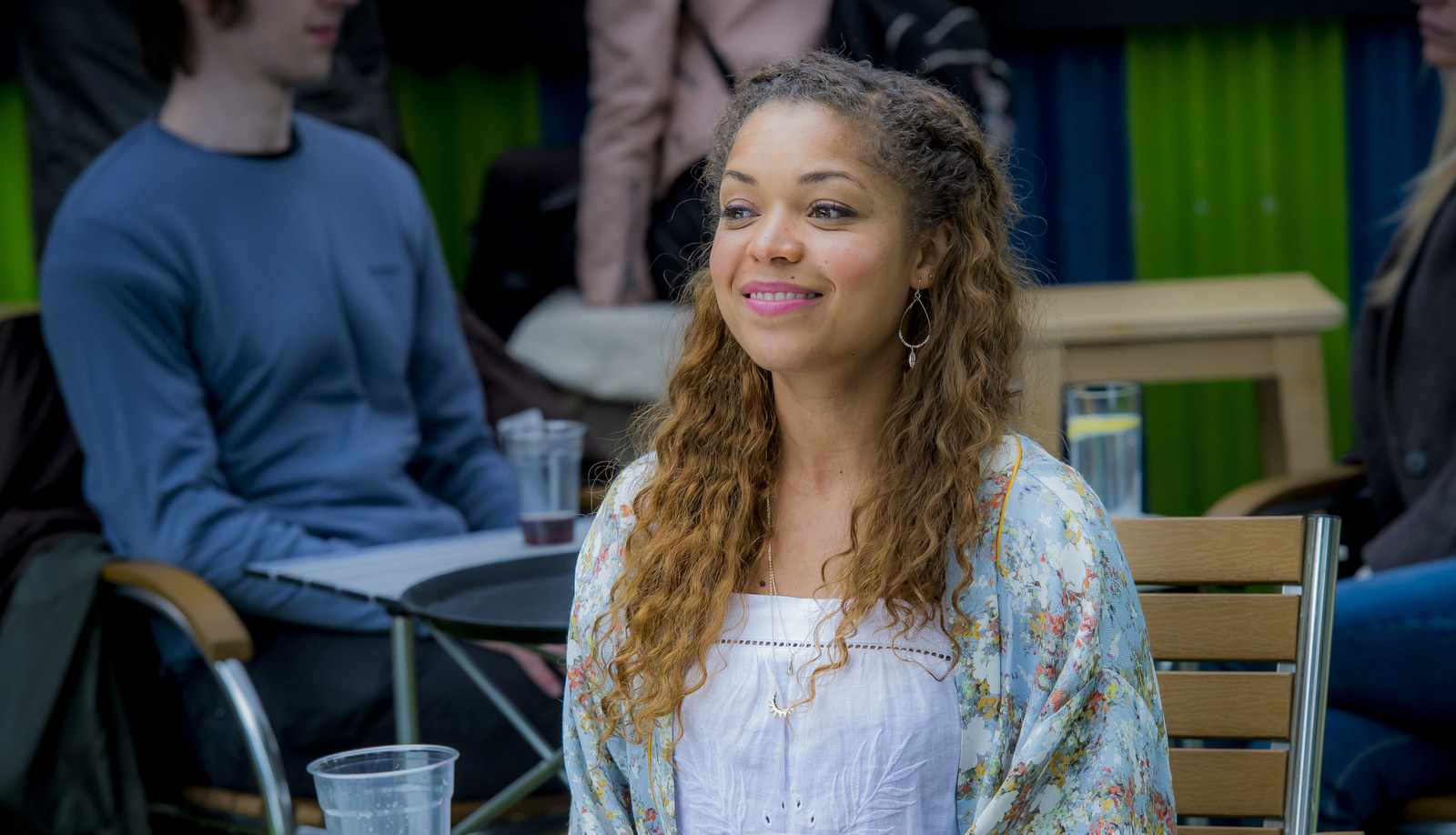
In the final episode of the season, the show explores Evie’s past love life, focusing on a man she might have married, Adal (Jaz Deol), if not for his disapproving, conservative parents. Seeing him (with his hijabi wife and baby daughter in tow) profoundly shakes Evie, and in turn jars Dylan. It throws up important questions: Is Evie wondering “what if?” And will Dylan allow himself to spiral down a needlessly emotional rabbit hole again? The interplay becomes a master class in showcasing character growth.
“Discovering that Evie has had a relationship that was deeply meaningful to her, and in another world she might have been married to someone else — and happily — that moment really threatens to burrow under [Dylan’s] skin,” said Edge. “Where we really wanted to land him was to greet Evie’s telling him of why she’s upset; her candor in that moment means she doesn’t dismiss it or downplay it. And rather than make it all about him, he tries to listen to her.”
Dylan’s sleeplessness after the conversation is a crossroads, and his decision at the end of it reveals the growth in him we’ve been watching for three seasons. “He recognizes that this is what he’s done forever — chase things down with questions and unrealistic demands. Ultimately what he has in this moment is a woman he loves, who comes with complications, as does he. I was hoping that you feel like he… It’s a moment where he profoundly checks that old bad habit and rather than stay up and chew these things over alone, he returns to her and allows himself to be in the moment and to love her as she is in that moment,” Edge laughs self-consciously. “I don’t know whether all of that plays, but that was my hope.”
He acknowledges it might be fleeting — that apparent moment of emotional maturity. “We know in that moment that something has changed. Whether it can endure is a different thing.” He laughs again.
"It isn't a show about race being problematic, it's a show about love being problematic."
A small but noticeable thing about Evie’s ex Adal is his clear Muslim identity. Neither Dylan nor Luke’s sexual pasts are monochrome either, and of course Evie, like Thomas who plays her, is mixed race. The lack of self-congratulation about the show’s inclusivity is welcome, but it doesn’t mean Edge and co. were not thinking about race and how mainstream Hollywood’s romantic comedies have excluded nonwhite people. He cites the Will Smith rom-com Hitch and its alleged racial casting decisions as being particularly bonkers. “You sort of think, Oh my holy fucking god! What a conversation to be having. Antonia’s terrific — she inhabits that role perfectly, but as I say, we were aware that there was a long and dysfunctional history of race and casting and romantic comedies. We’ve been nothing but pleased to see the reaction of black women in particular, responding to the show and finding that it isn’t a show about race being problematic, it’s a show about love being problematic. And that’s what the characters are preoccupied with.”
“Lovesick is one of the only shows that I’ve been up for where race was not a factor in the casting breakdown,” said Thomas. “They saw everybody. The most pressing part of the show is that it’s never been an issue… It’s not ever been ‘oh, this is the part where we discuss the fact that Evie is mixed race and Dylan is white.’” Evie’s brownness as fact is threaded in the show: Her (brown) sister turns up, as does her (brown) cousin.
Thomas brings up Nikki Amuka-Bird, who plays one of Dylan’s exes, Anna: “It’s reflective of society today. And rom-coms, more often than not — they’re all totally whitewashed. At no point in the story have they felt that they needed to explain why I’m brown. It’s been very important to me.”
Edge praises the work of his two leads away from Lovesick, including the fact that Antonia is in a breakout new network drama — ABC’s The Good Doctor — and counts himself lucky that the show has continued despite outside interests. “In a country where we don’t necessarily option people for seven years from audition, it was really important that they all enjoy playing with each other and they’d all want to come back.”
For Thomas, who said she was always “frightened of comedy” because she never saw herself as funny, Lovesick has made her more open to opportunities. “If something else came along, then of course I’d be into it. At the same time, I think I’d be hard pushed to find something that I like just as much. It’s been hands down — aside from Misfits and a few other things — one of my very favorite jobs, because there’s just such joy involved,” said Thomas. “It’s a real fusion: great writing, great people. It’s been one of the best experiences I’ve ever had.”
The hope for Edge is that they will get to keep exploring these friends, their loves and their lives, in a fourth season. That was always the plan, even if the audience went global with acquisition by Netflix. “Being British, we obviously go three episodes and then we’re exhausted!” he joked. “I think at this juncture, it feels like if we got to do a fourth season, we have a good idea of what that would be.” He’s just waiting on the powers that be on whether they’ll get that chance.
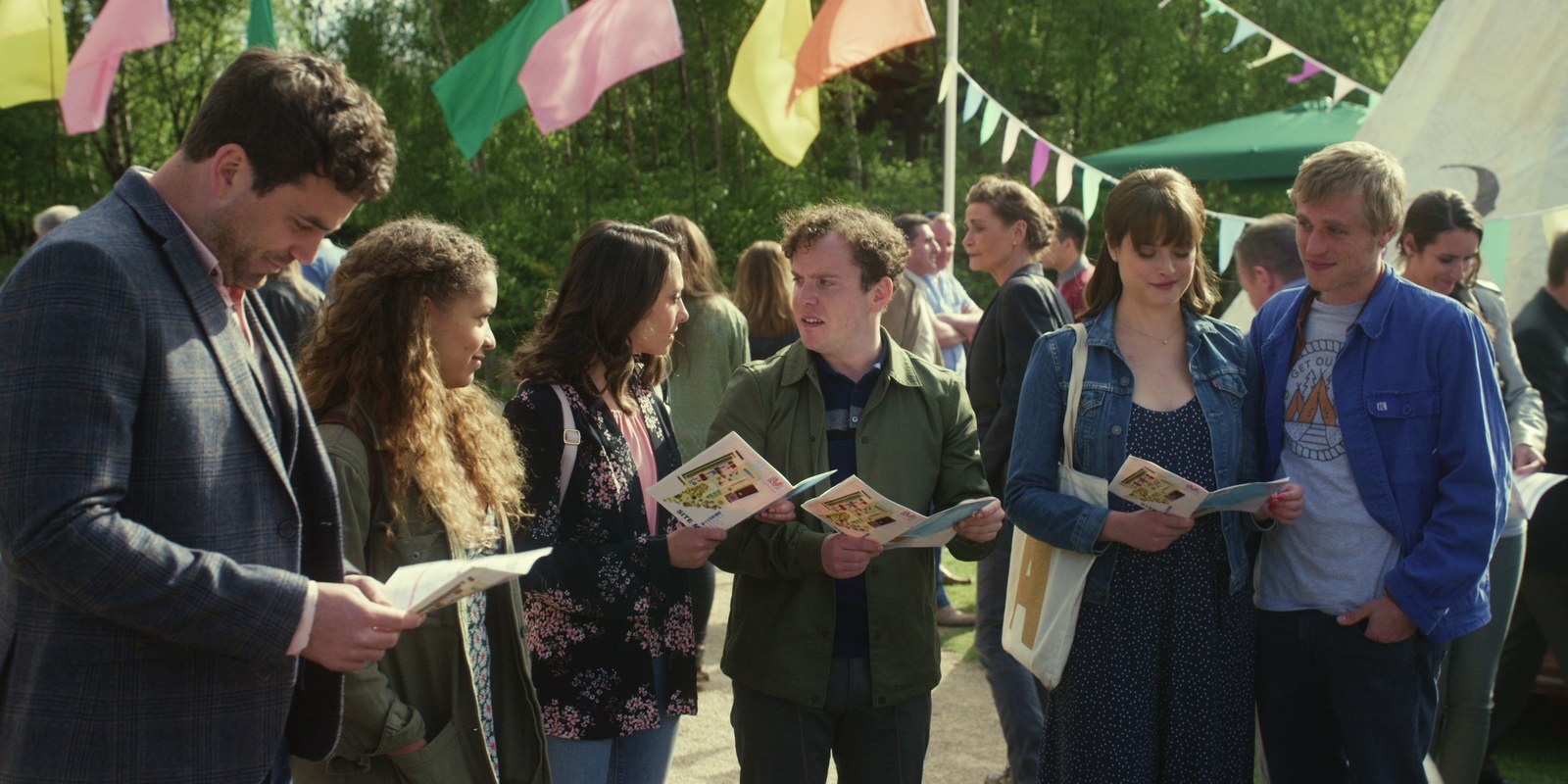
Evie and Dylan seem to be on the path to joining the pantheon of great TV couples, and Edge’s legacy on that front seems secure. But it has to be asked: Does he think they’ll go the distance? Edge will not say definitively. “It has been such a preoccupation, this long-running sense of either connecting with the wrong people or a real yearning, thinking, If I was with that person, would that unlock everything? Do you spend the rest of your life in a Zen-like state of meditative calm before passing away politely in your 90s? I suspect not.”
Whatever happens will have to feel true to the characters’ journeys thus far. “What I can say is they know each other so well and their relationship has been hard-won. I don’t think either of them will treat it lightly; it doesn’t feel like a frippery to be thrown away. And nor, as the show’s makers, would we throw it away for the sake of a plot point or to shift things along.” For a pair as neurotic as Dylan and Evie, there will be no shortage of new questions — is perfect love possible? — and compromises. The trick for them will be to find the point where those compromises begin to chafe and impinge on individual identity. The urge to say, as Evie does in the back half of the third season, “You’re quite a lot of hard work, aren’t you?” is suddenly very strong.
So, fine. Forget all the serendipitous meeting of minds and flawless execution — how do you write such a perfect romantic comedy? Edge huffs out another laugh before answering. “I suppose it begins with a sincere love of the genre, and [having] some kind of faith that those stories — even though we’ve seen a million variants of them — are still worth telling and still worth probing, because loving people, whether they’re your friends, your family, or people that you may ultimately settle down with, is such a fundamental part of humanity. A part of me gets a little kick saying, ‘Look, we think there are good, universal, and meaningful and timely stories to tell over here.’”
Edge pauses one last time. “Oh, and a big whiteboard. A big whiteboard would be the last thing.” ●
